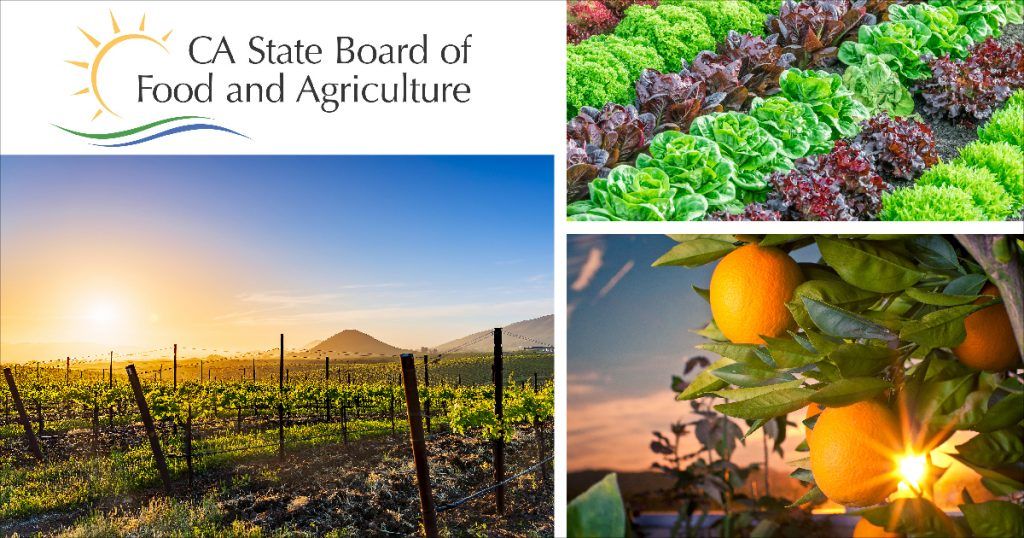Our own Pam Marrone attended the recent California State Board of Food & Agriculture* meeting on December 16th, 2020. Below are highlights from a discussion on Ag innovation.
Walt Duflock (Vice-President of Innovation for Western Growers) and Dennis Donohue (Director of Western Growers Center for Innovation & Technology) gave a talk to the California State Board of Food & Agriculture about ag innovation. They recollected a time when the industry was very competitive and growers were not cooperating on the things that held them back like water, food safety, and labor. Things have improved somewhat. Walt and Dennis made a call for enhanced cooperation among CA growers by putting capital together to attract Agtech ventures and to address key issues at hand. California has a broad range of specialty crops with diverse regions. Innovation in the produce sector is primitive compared to row crops. Little has been accomplished on specialty crops and there still exist many big problems to be solved. There are many entrepreneurs that are reaching out to growers with their innovative solutions. Now, the time is critical for attracting venture capital and to scale up the startups. For these reasons, Western Growers is spending more time on the vetting process of Agtech entrepreneurs. This will help entrepreneurs to get field trials for their members and thus help entrepreneurs scaleup their businesses.
Walt and Dennis pointed out that this is the most exciting time in the industry! We have grown weary fighting the same battles: labor, water supply, regulations, and food safety. There is evermore promise of technology and innovation that will solve these challenges to keep the business of farming viable in California.

Automation is critical to reducing dependence on labor, food safety challenges, water supply & quality. California farmers are 20-30% chronically short on the workforce. Members do not say they will cut jobs because of automation, rather they say that jobs will change from hard labor to better jobs operating more sophisticated systems. Walt and Dennis stressed that it’s not labor vs. management! We should focus on utilizing every inch of land for crop production using harvest automaton such as AI, visioning, robots, high tech tractors, etc. Western Growers and Western Growers Center for Innovation & Technology are helping startups with more mentoring and support to scale up faster through a vetting process to enable entrepreneurs to better compete with tech in Silicon Valley. They also suggested different ways to help startups attract more venture capital into the system. Having reference architecture and standard interfaces with tractors, large image libraries of fruit and vegetables in the field will help companies get to market faster and reduce the design and development time-period. The Center is working on a roadmap that inventories all harvest startups. Members and startups execute together and publish information from growers trying the technology. An annual report highlighting the impact of harvest innovation on growers’ ROI (e.g., number of hours saved by using harvest automation) will be published.
The next big issue after labor is food safety, and there is a need to better identify the problems and fix them. The goal here is to also map the companies and help them scale faster. Which technologies can be used in the tech stack? Western Growers is leading the way on food safety. For example, more products can be tested for pathogens in hours rather than weeks. There is a need to brainstorm ways to scale these testing technologies to fix food safety problems before they get widespread.
Debbie Reed from the Ecosystems Services Market Consortium also spoke at the State Board meeting. Ecosystems Services Market Consortium is a fairly new impact-driven non-profit startup focused on issues related to the impact of agriculture on climate change. Debbie spoke about scaling up soil health across the country which is an initiative in sync with the organization’s mission to advance ecosystem service markets that incentivize farmers and ranchers to improve soil health systems that benefit society. Debbie mentioned they are collaborating with ESMC members on a series of pilot projects in major agricultural production systems to test and refine their protocols and tools. They have a project in Kansas with wheat growers and are just starting on specialty crops.
Walt or Dennis will represent Western Growers in the BAW Congress 2021 and share the knowledge and insight to address various issues in BioAg industry.
*The California State Board of Food and Agriculture serves the interest of the state’s diverse agricultural community and it is a fifteen-member state board, appointed by the Governor. The Board serves as an advisory board to the governor and secretary, representing a broad range of agricultural commodities, a variety of geographic regions, and both the University of California and California State University academic systems. It addresses key issues that are of importance to California’s farmers and ranchers, community stakeholders, and citizens. The board encourages public participation and input in all matters concerning agriculture and food policy within the state.
